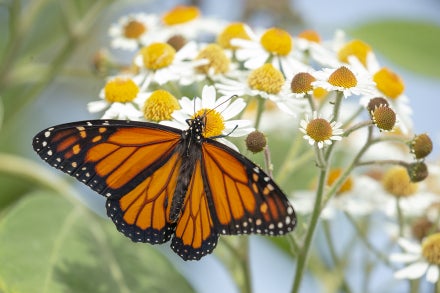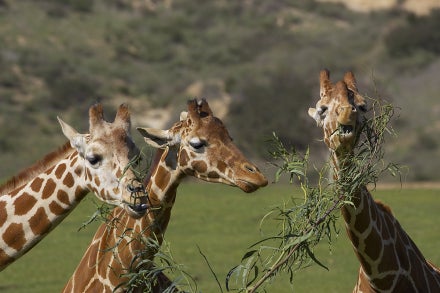Image

Guests at the San Diego Zoo Safari Park’s Tull Family Tiger Trail were treated to a sneak peek yesterday (Friday, Oct. 13, 2017) of two tiger cubs exploring the habitat for their very first time. The 14-week-old Sumatran tiger cub and the approximately 12-week-old Bengal tiger cub are currently being hand-raised in the nursery at the Safari Park’s Ione and Paul Harter Animal Care Center and are being prepared to move to their new home at Tiger Trail within the next few weeks.
“This was a big day for our little tiger cubs,” said Lissa McCaffree, lead keeper, San Diego Zoo Safari Park. “The cubs are outgrowing our nursery setting, and today’s outing allowed them to explore what will be their new home at Tiger Trail. They had never experienced the dirt and mulch on the ground, or big plants or tree limbs. They did very well, and we’re excited for their next big step and watching them grow in their new surroundings.”
Keepers transported the tiger cubs from the nursery to Tiger Trial in a carrier. When they placed the carrier on the ground and opened the door in the large habitat, the Sumatran tiger cub—considered to be bolder and braver than the Bengal cub—hesitated only a moment, stepped out of the crate and began exploring his new surroundings. The shy Bengal cub took a little more time to acclimate to the new area before he was comfortable experiencing all the new sights, smells and sounds the habitat had to offer. Once together, it did not take the playful pair long to exhibit their natural behaviors of stalking, pouncing, climbing on tree limbs, crouching and playing in foliage.
The Bengal tiger cub was brought to the San Diego Zoo Safari Park Aug. 23, after being confiscated by U.S. Customs and Border Protection officers during a vehicle inspection at the U.S./Mexico port of entry near San Diego. The cub remains under the jurisdiction of the U.S. Fish and Wildlife Service. San Diego Zoo Global is committed to reducing demand for illegal wildlife products, as part of the organization’s broader efforts to end extinction.
The Sumatran tiger cub was born at the Smithsonian’s National Zoo, but his mother was unable to care for him properly. Both the San Diego Zoo Safari Park and the National Zoo are members of the Association of Zoos and Aquariums (AZA), and in a collaborative effort, both zoos’ animal care teams determined the best solution for the well-being of the National Zoo cub was to transfer him to the care of keepers at the Safari Park, providing the Bengal cub with a playmate.
The cubs are closely bonded, and they are growing strong. They are currently being weaned from their formula, and their carnivore diet has been increased. Both cubs now weigh 25 pounds. As they continue to grow, the Bengal tiger will eventually outweigh the Sumatran tiger by about 200 pounds.
Keepers plan to bring the cubs to Tiger Trail each day, gradually acclimating them to their new home. “We are thrilled to have these little cubs move to Tiger Trail,” stated Katie Christofferson, keeper, San Diego Zoo Safari Park. “We are used to seeing our 200 plus pound tigers on exhibit. These little 25 pound cubs seem so small. It was really fun to see them slide on logs, climb over rocks and play in the plants.”
While at Tiger Trail, the cubs may not always be visible to guests, as they will be rotated to become accustomed to their off-exhibit bedrooms as well as their on-exhibit habitat. No specific times have been set for these visits, so guests wishing to see the cubs should check with a Safari Park guest ambassador at either the Animal Care Center or Tiger Trail, to find out when they may be viewable. They also may be seen from time to time on the Safari Park’s online Tiger Cam, at sdzsafaripark.org/tiger-cam.
The critically endangered Sumatran tiger and endangered Bengal tiger face many challenges in the wild, from loss of habitat to conflicts with humans, but the biggest threat continues to be poaching. Tigers are killed by poachers who illegally sell tiger body parts, mostly for folk remedies. People can help protect wild tigers by avoiding products made with non-sustainable palm oil, an industry that harms tiger habitat; and by refusing to purchase items made from endangered wildlife.




